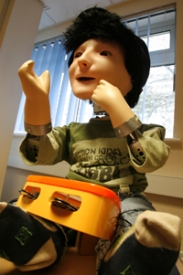Oct 19 2010
Researchers at the Hertfordshire University headed by Professor Kerstin Dautenhahn have developed Kinesics and Synchronization in the Personal Assistant Robot (KASPAR), a child-sized robot for teaching Autistic children social interaction.
This robot will be showcased at the Rise of the Machines event which is organized by the Royal Society as a part of its 350th centenary carnival in 2010.
 KASPAR Robot
KASPAR Robot
KASPAR is presently employed in human-robot interaction research on the basis of assistive technology and cognitive and developmental robotics including research of feasible remedial and educational advantages of ‘robotic mediators,’ for autism affected children.
At the event, Professor Dautenhahn will be accompanied by Tony Ballantyne, a modern science fiction writer for discussing the prospects of Robotics and Artificial Intelligence. This event will be jointly held by SCI-FI-London and will feature various questions regarding implications of robots on future society.
Professor Dautenhahn has stated that this event will be participated by both common people and robotics experts, thereby helping to highlight various false impressions regarding intelligent and social robots. She added that social robots can be employed in various applications including helping the elderly and in various therapies. She confirmed that even though these robots feature various innovative characteristics they will continue to remain as socially active machines without any pretension.